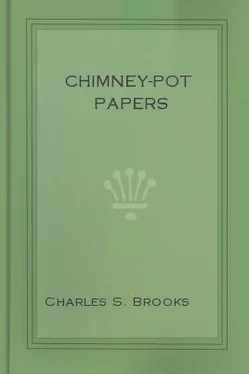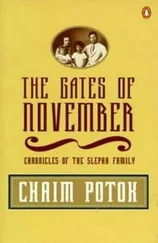Charles Brooks - Chimney-Pot Papers
Здесь есть возможность читать онлайн «Charles Brooks - Chimney-Pot Papers» весь текст электронной книги совершенно бесплатно (целиком полную версию без сокращений). В некоторых случаях можно слушать аудио, скачать через торрент в формате fb2 и присутствует краткое содержание. Город: London, Год выпуска: 1920, Издательство: New Haven: Yale University Press, Жанр: Юмористическая проза, на английском языке. Описание произведения, (предисловие) а так же отзывы посетителей доступны на портале библиотеки ЛибКат.
- Название:Chimney-Pot Papers
- Автор:
- Издательство:New Haven: Yale University Press
- Жанр:
- Год:1920
- Город:London
- ISBN:нет данных
- Рейтинг книги:4 / 5. Голосов: 1
-
Избранное:Добавить в избранное
- Отзывы:
-
Ваша оценка:
- 80
- 1
- 2
- 3
- 4
- 5
Chimney-Pot Papers: краткое содержание, описание и аннотация
Предлагаем к чтению аннотацию, описание, краткое содержание или предисловие (зависит от того, что написал сам автор книги «Chimney-Pot Papers»). Если вы не нашли необходимую информацию о книге — напишите в комментариях, мы постараемся отыскать её.
Chimney-Pot Papers — читать онлайн бесплатно полную книгу (весь текст) целиком
Ниже представлен текст книги, разбитый по страницам. Система сохранения места последней прочитанной страницы, позволяет с удобством читать онлайн бесплатно книгу «Chimney-Pot Papers», без необходимости каждый раз заново искать на чём Вы остановились. Поставьте закладку, и сможете в любой момент перейти на страницу, на которой закончили чтение.
Интервал:
Закладка:
There are cool retreats where you may rest at noon, but Stevenson has written of these. "You come," he writes, "to a milestone on a hill, or some place where deep ways meet under trees; and off goes the knapsack, and down you sit to smoke a pipe in the shade. You sink into yourself, and the birds come round and look at you; and your smoke dissipates upon the afternoon under the blue dome of heaven; and the sun lies warm upon your feet, and the cool air visits your neck and turns aside your open shirt. if you are not happy, you must have an evil conscience."
And yet a good inn at night holds even a more tranquil joy. M—— and I, who frequently walk upon a holiday, traversed recently a mountain road to the north of West Point. During the afternoon we had scrambled up Storm King to a bare rock above the Hudson. It was just such an outlook as Rip found before he met the outlandish Dutchmen with their ninepins and flagon. We lay here above a green world that was rimmed with mountains, and watched the lagging sails and puffs of smoke upon the river. It was late afternoon when we descended to the mountain road that runs to West Point. During all the day there had been distant rumbling of thunder, as though a storm mustered in a far-off valley,—or perhaps the Dutchmen of the legend still lingered at their game,—but now as the twilight fell the storm came near. It was six o'clock when a sign-board informed us that we had seven miles to go, and already the thunder sounded with earnest purpose. Far below in the dusk we saw the lights of West Point. On a sudden, while I was still fumbling for my poncho which was rolled inside my rucksack, the storm burst upon us. We put up the umbrella and held the poncho against the wind and driving rain. But the wind so whisked it about and the rain was so eager to find the openings that presently we were drenched. In an hour we came to West Point. luckily the cook was up, and she served us a hot dinner in our rooms with the washstand for a table. When we started there was a piece of soap in the dish, but I think we ate it in our hunger. I recall that there was one course that foamed up like custard and was not upon the bill. It was a plain room with meager furniture, yet we fell asleep with a satisfaction beyond the Cecils in their lordly beds. I stirred once when there was a clamor in the hall of guests returning from a hop at the Academy—a prattle of girls' voices—then slept until the sun was up.
But my preference in lodgings is the low sagging half-timbered building that one finds in the country towns of England. It has leaned against the street and dispensed hospitality for three hundred years. It is as old a citizen as the castle on the hill. It is an inn where Tom Jones might have spent the night, or any of the rascals out of Smollett. Behind the wicket there sits a shrewish female with a cold eye towards your defects, and behind her there is a row of bells which jangle when water is wanted in the rooms. Having been assigned a room and asked the hour of dinner, you mount a staircase that rises with a squeak. There is a mustiness about the place, which although it is unpleasant in itself, is yet agreeable in its circumstance. A long hall runs off to the back of the house, with odd steps here and there to throw you. Your room looks out upon a coach-yard, and as you wash you overhear a love-passage down below.
In the evening you go forth to see the town. If it lies on the ocean, you walk upon the mole and watch the fisher folk winding up their nets, or sitting with tranquil pipes before their doors. Maybe a booth has been set up on the parade that runs along the ocean, and a husky fellow bids you lay out a sixpence for the show, which is the very same, he bawls, as was played before the King and the Royal Family. This speech is followed by a fellow with a trombone, who blows himself very red in the face.
But rather I choose to fancy that it is an inland town, and that there is a quieter traffic on the streets. Here for an hour after dinner, while darkness settles, you wander from shop to shop and put your nose upon the glass, or you engage the lamplighter as he goes his rounds, for any bit of news.
Once in such a town when the night brought rain, for want of other employment, I debated divinity with a rigid parson, and until a late hour sat in the thick curtain of his attack. It was at an inn of one of the midland counties of England, a fine old weathered building, called "The King's Arms." In the tap—for I thrust my thirsty head inside—was an array of old pewter upon the walls, and two or three prints of prize fighters of former days. But it was in the parlor the parson engaged me. In the corner of the room there was a timid fire—of the kind usually met in English inns—imprisoned behind a grill that had been set up stoutly to confine a larger and rowdier fire. My antagonist was a tall lank man of pinched ascetic face and dark complexion, with clothes brushed to shininess, and he belonged to a brotherhood that lived in one of the poorer parts of London along the wharves. His sojourn at the inn was forced. For two weeks in the year, he explained, each member was cast out of the conventual buildings upon the world. This was done in penance, as the members of more rigid orders in the past were flagellants for a season. So here for a whole week had he been sitting, for the most part in rainy weather, busied with the books that the inn afforded—advertising booklets of the beauties of the Alps—diagrams of steamships—and peeking out of doors for a change of sky.
It was a matter of course that he should engage me in conversation. He was as lonesome for a chance to bark as a country dog. Presently when I dissented from some point in his creed, he called me a heretic, and I with gentlest satire asked him if the word yet lived. But he was not angry, and he told me of his brotherhood. It had a branch in America, and he bade me, if ever I met any of its priests, to convey to them his warm regards. As for America, it was, he said, too coldly ethical, and needed most a spiritual understanding; to which judgment I assented. I wonder now whether the war will bring that understanding. Maybe, unless blind hatred smothers it.
This priest was a mixture of stern and gentle qualities, and seemed to be descended from those earlier friars that came to England in cord and gown, and went barefoot through the cities to minister comfort and salvation to the poor and wretched. When the evening was at last spent, by common consent we took our candles on the landing, where, after he inculcated a final doctrine of his church with waving finger, he bade me good night, with a wish of luck for my journey on the morrow, and sought his room.
My own room lay down a creaking hallway. When undressed, I opened my window and looked upon the street. All lights were out. At last the rain had ceased, and now above the housetops across the way, through a broken patch of cloud, a star appeared with a promise of a fair tomorrow.
ON LIVELIHOODS
 omewhere in his letters, I think, Stevenson pronounces street paving to be his favorite occupation. I fancy, indeed,—and I have ransacked his life,—that he never applied himself to its practice for an actual livelihood. That was not necessary. Rather, he looked on at the curb in a careless whistling mood, hands deep in the pockets of his breeks, in a lazy interval between plot and essay. The sunny morning had dropped its golden invitation through his study windows, and he has wandered forth to see the world. Let my heroes—for thus I interpret him at his desk as the sunlight beckoned—let my heroes kick their heels in patience! Let villains fret inside the inkpot! Down, sirs, down, into the glossy magic pool, until I dip you up! Pirates—for surely such miscreants lurked among his papers—let pirates, he cries, save their red oaths until tomorrow! My hat! My stick!
omewhere in his letters, I think, Stevenson pronounces street paving to be his favorite occupation. I fancy, indeed,—and I have ransacked his life,—that he never applied himself to its practice for an actual livelihood. That was not necessary. Rather, he looked on at the curb in a careless whistling mood, hands deep in the pockets of his breeks, in a lazy interval between plot and essay. The sunny morning had dropped its golden invitation through his study windows, and he has wandered forth to see the world. Let my heroes—for thus I interpret him at his desk as the sunlight beckoned—let my heroes kick their heels in patience! Let villains fret inside the inkpot! Down, sirs, down, into the glossy magic pool, until I dip you up! Pirates—for surely such miscreants lurked among his papers—let pirates, he cries, save their red oaths until tomorrow! My hat! My stick!
Интервал:
Закладка:
Похожие книги на «Chimney-Pot Papers»
Представляем Вашему вниманию похожие книги на «Chimney-Pot Papers» списком для выбора. Мы отобрали схожую по названию и смыслу литературу в надежде предоставить читателям больше вариантов отыскать новые, интересные, ещё непрочитанные произведения.
Обсуждение, отзывы о книге «Chimney-Pot Papers» и просто собственные мнения читателей. Оставьте ваши комментарии, напишите, что Вы думаете о произведении, его смысле или главных героях. Укажите что конкретно понравилось, а что нет, и почему Вы так считаете.











